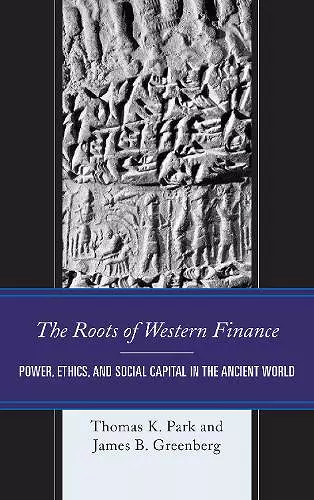The Roots of Western Finance
Power, Ethics, and Social Capital in the Ancient World
Thomas K Park author James BGreenberg author
Format:Paperback
Publisher:Bloomsbury Publishing PLC
Published:10th Jun '19
Currently unavailable, and unfortunately no date known when it will be back
This paperback is available in another edition too:
- Hardback£90.00(9781498545815)

In The Roots of Western Finance: Power, Ethics, and Social Capital in the Ancient World, Thomas K. Park and James B. Greenberg take an anthropological approach to credit. They suggest that financial activities occur in a complex milieu, in which specific parties, with particular motives, achieve their goals using a form of social, cultural, or economic agency. They examine the imbrication of finance and hidden interests in Mesopotamia, ancient Egypt, classical Greece and Rome, the early Judeo-Christian traditions, and the Islamic world to illuminate the ties between social, ethical, and financial institutions. This unique breadth of research provides new perspectives on Mesopotamian ways of incentivizing production through financial arrangements, the source of Egyptian surpluses, linguistics and usury, metrological influences on finance, and the enduring importance of honor and social capital. This book not only illustrates the particular cultural logics that drove these ancient economies, it also depicts how modern society’s financial techniques, ethics, and concerns with justice are attributable to a rich multicultural history.
Finance, debt, and repayment are a dynamic and creative—but also sometimes destructive—feature of societies, past and present. Besides the fascination of the ancient case studies in this book, the authors show that debt can be integrated into a well-regulated social whole rather than being allowed to run amok. The result is an important and perceptive work. -- Josiah Heyman, director of the Center for Inter-American and Border Studies, University of Texas at El Paso
This first work is part of an ambitious two volume enterprise in which Park and Greenberg lay out an intensive and extensive narrative of the ancient economic worlds of credit from ancient Mesopotamia through Ancient Egypt to Classical Athens and the Early Republic of Rome though the social networking and finance that was followed by the Christian and Islamic worlds. Focusing on the “Hidden Interests” embedded within social and economic relationships of these ancient enterprises and their institutional forms and practices, Park and Greenberg have provided an astonishingly well-crafted treatise using an array of documentation from legal agreements to personal negotiations between parties and from the use of labor to long-distance trade contracts. As the authors’ state unequivocally: "Norms of commercial and financial behavior in the ancient world were increasingly constrained by a judicial structure that followed predictable and well formulated rules and procedures that required explicit specifications in formal contracts. Yet, as in earlier and later societies, they were also constrained by customary expectations about honorable, not just legal, behavior." From these ancient sources, the narrative explicitly supports the main contention that social beings did not behave in exclusively self-centered ways but instead such a credo was a mythic construction of the twentieth century. I look forward to their second volume in which these “hidden interests” are examined in both Europe and North Africa by focusing on the role of social capital and ethical thought in financial systems. -- Carlos Velez-Ibanez, Arizona State University
The Roots of Western Finance presents a sweeping panorama of financial history in the ancient world, yet remains analytically precise. It is an intellectual and scholarly tour de force. Drawing on the best scholarly work available, and on the authors' own linguistic skills, they develop original interpretations of ancient records to describe the ways that finance and credit evolved out of ethical systems and beliefs about justice—showing that these latter were more significant than any pressures from markets—indeed, markets as we know them often did not even exist! But ethics and justice did, and provided the basis for the development of finance. -- Edward J. Nell, New School for Social Research
Professors Park and Greenberg show that the continual transformations which led to the modern financial system have been motivated, among others, by a special set of ethical principles. They examine the role of these ethical components in the archetypal credit transactions of Mesopotamia, and thereafter in ancient Egypt, classical Greece, Rome, and in the view of what is just and equitable in early Judeo-Christian and Islamic law and finance. This remarkable volume contributes much comparative data and analysis in support of what a growing number of interdisciplinary social science researchers, including this writer, hold as universal truths. -- Boris Kozolchyk, National Law Center for Inter-American Free Trade
ISBN: 9781498545839
Dimensions: 219mm x 152mm x 19mm
Weight: 494g
304 pages